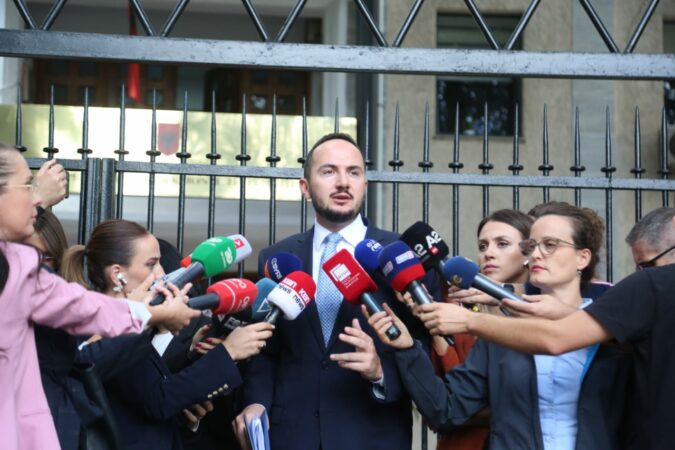Democratic Party MP Salianji appears in court surrounded by Democratic Party MPs for appeal in ‘Babale’ case

Photo: Ervin Salianji
Democratic Party MP Ervin Salianji appeared at the Court of Appeals today accompanied by a large group of Democratic Party MPs as final arguments were presented in the so-called “Babale” case, where Salianji faces charges of “fraudulent reporting.”
Context
The “Babale” case is a high-profile legal scandal that began in May 2018, involving allegations made by Salianji and other Democratic Party members about drug trafficking by Geron Xhafaj, the brother of former Interior Minister Fatmir Xhafaj. They presented an audio recording, allegedly proving Xhafaj’s involvement, which was later proven to be staged and fabricated. The recording, reportedly made by Albert Veliu (known as “Babale”) and his associates, one of whom a journalist in an opposition news platform, was found to be a setup designed to discredit the former minister and his family.
Salianji’s Role
Salianji played a central role in exploiting the recordings for political ends, publicizing them, organizing press conferences with other Democratic Party members to accuse Xhafaj. However, after an investigation, the authorities concluded that the recording was falsified, and Salianji was charged with knowingly making a fraudulent report to the police. In December 2019, he was sentenced to one year in prison, a decision he is currently appealing. Salianji and his legal team argue that the conviction was politically motivated and that he should be acquitted.
Pressure on the Court
Salianji arrived at the court surrounded by 15 Democratic MPs, an unusual move seen by some as an attempt to influence or pressure the judicial process. The presence of MPs echoed past controversial court scenes, drawing comparisons to other high-profile trials where similar tactics were used by MPs from the Democratic Party. Critics have described the large turnout of opposition lawmakers as a form of intimidation towards the court.
Statements
During the session, Salianji denied any wrongdoing, claiming his actions were legitimate attempts to expose corruption and criminality within the government. He maintained his innocence, arguing that the allegations against him were politically driven.
What’s next
The Court of Appeals will announce its decision on September 26. The ruling will determine whether Salianji’s conviction will be upheld or overturned, which could have significant implications for his political career and the broader narrative of corruption and justice in Albania.


